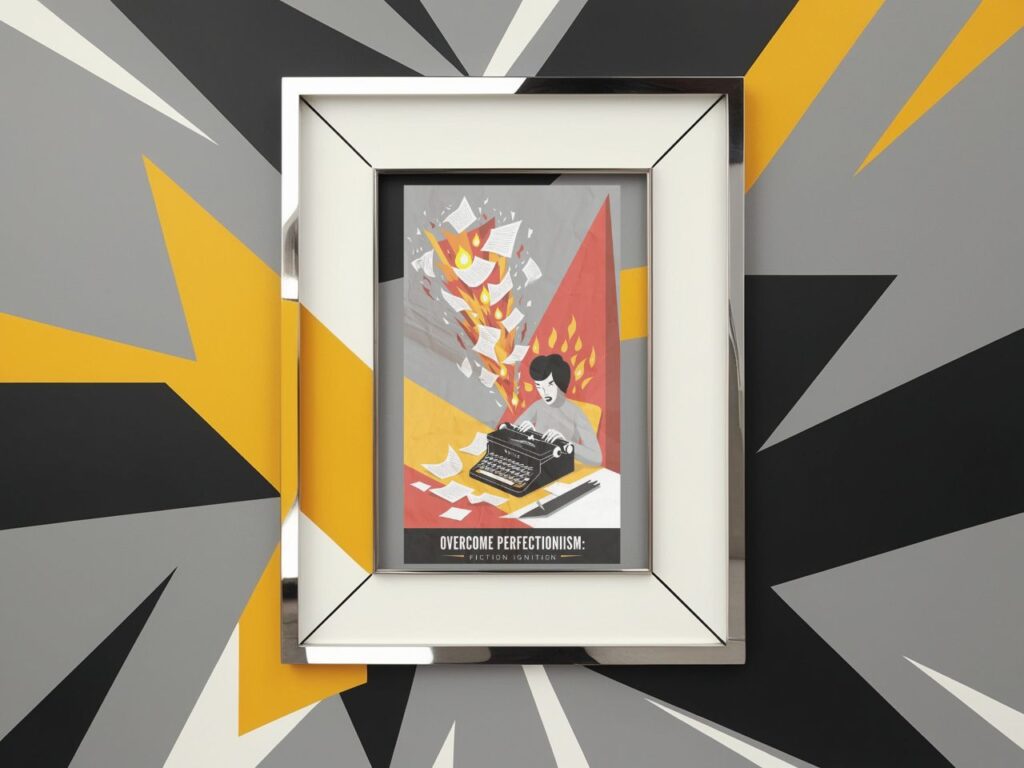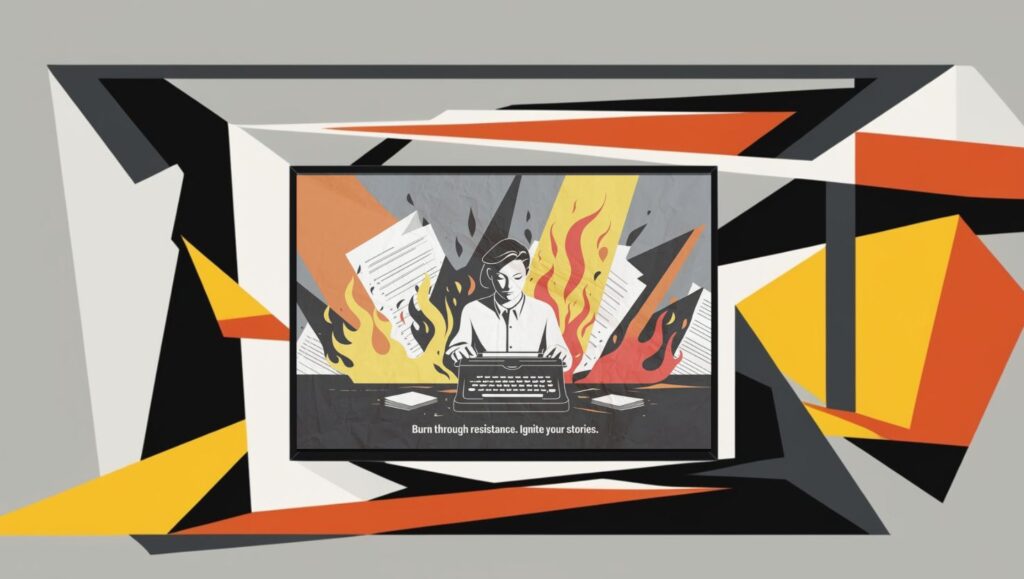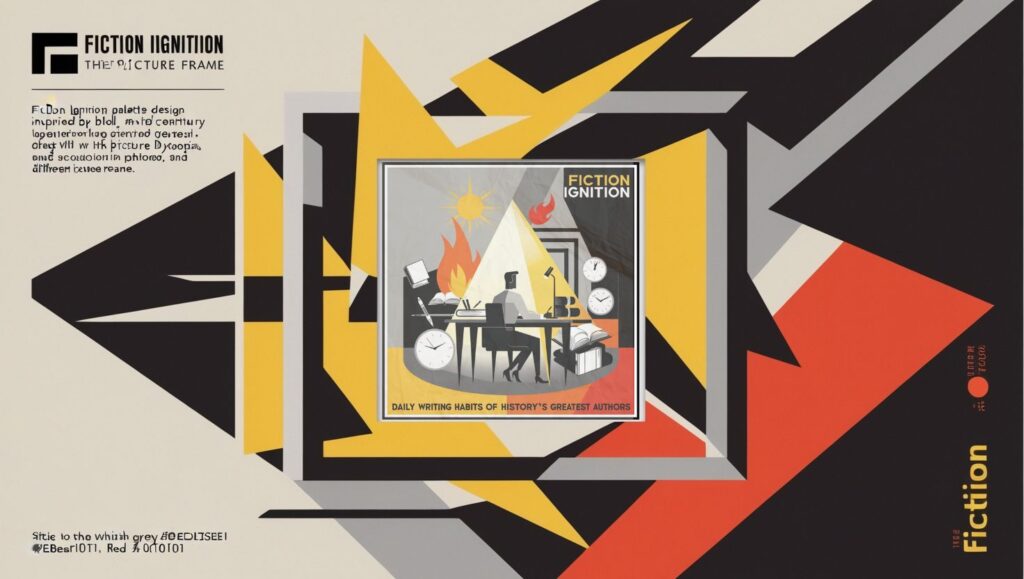Want the formula to write the perfect first draft? Here it is:
Don’t even try.
Hello, Fiction Igniters!
Let me ask you this: have you ever stared at a blank page so long it started to stare back—like some smug, white rectangle of doom whispering, “You’ll never be good enough”? Yeah? Welcome to the club. Pull up a flaming chair by the firepit, because we’re going to torch that toxic myth once and for all: you do NOT need a perfect first draft.
Today, we’re diving into one of the most crippling myths out there—the myth of the perfect first draft—and how it feeds on our perfectionism, procrastination, and adult underachievement. This is personal. This is painful. This is powerful. And if you’re like me, someone who battles compulsive procrastination, ADHD symptoms, and perfectionist paralysis on the regular, this might just save your writing life.
The Myth of the Perfect First Draft
Here’s the flaming truth, my prose pioneers: no one—and I mean NO ONE—writes a perfect first draft. Not Tolkien, not King, not Rowling, and certainly not your friendly neighborhood Flamekeeper. Hemingway, never known for mincing words, once said, “The first draft of anything is sh*t.” Truer words have never scorched the page.
Anne Lamott, author of Bird by Bird, talks about “sh***y first drafts.” She says, “Almost all good writing begins with terrible first efforts. You need to start somewhere.” She’s spot on. Your first draft is like a lump of clay. You can’t sculpt a masterpiece until you have the clay to work with.
Personal Experience: Battling Perfectionism, Procrastination and ADHD
As someone with ADHD symptoms, I’ve often struggled with maintaining focus and resisting the urge to perfect every sentence before moving on. This all-or-nothing mentality has been a significant barrier in my writing journey.
I used to believe that if I couldn’t write for hours and produce something exceptional, it wasn’t worth starting. This mindset led to prolonged periods of inactivity, where fear of imperfection kept me from writing anything at all.
However, I’ve learned that taking minimal steps, like committing to just fifteen minutes of writing each day, can lead to significant progress over time. This approach has helped me overcome the paralysis induced by perfectionism and has made writing a more manageable and enjoyable process.
I used to fall into this trap all the time. I’d write three sentences, reread them, then rewrite them ten times before moving on. Guess what? That’s not writing; that’s editing. And editing has its place, but it’s not when you’re drafting.
Let me be vulnerable with you for a second. I used to believe my stories had to come out polished, perfect, fully formed. I would write three lines, reread them, rewrite them ten times, delete everything, and end up spiraling into shame and self-loathing. Sound familiar? That’s not writing—it’s self-sabotage in a trench coat.
I’ve been learning—painfully, slowly, imperfectly—that I am not a home run hitter. I’m not the kind of guy who hits it out of the park on the first try. And you know what? That’s okay. Because writing isn’t baseball. It’s blacksmithing. You hammer, you melt, you shape, you revise. You get burned, and you keep going.
Perfectionism is the Fancy Hat of Procrastination
Perfectionism whispers lies in your ear: “You’re not good enough. This isn’t good enough.” Here’s a truth bomb for you: perfectionism is just procrastination wearing a fancy hat.
Perfectionism is not about high standards. It’s about fear. It’s about shame. It’s about being so terrified of not being good enough that we freeze in place. And for those of us with ADHD symptoms, this is like gasoline on the fire. We hyperfocus on the wrong details, get lost in the weeds, and end up doing nothing.
Overcoming Perfectionism: Lessons from Your Own Worst Enemy by Dr. Kenneth W. Christian
I recently read Your Own Worst Enemy: Breaking the Habit of Adult Underachievement by Dr. Kenneth W. Christian, and it blew the doors off my mental prison. The book delves into self-limiting behaviors and how they hinder our potential. Christian introduces the concept of Self-Limiting High-Potential Persons (SLHPPs), individuals who, despite their capabilities, hold themselves back due to fear, perfectionism, and procrastination.
One of the key takeaways from the book is the importance of recognizing and challenging these self-imposed limitations. By understanding the underlying causes of our perfectionism and procrastination, we can develop strategies to overcome them and unlock our true potential.
Reading Dr. Kenneth’s book was a turning point for me. It made me realize how much my perfectionism, my compulsive procrastination, and my all-or-nothing thinking were just tools I used to protect my ego. Better to never finish a project than to risk making something mediocre, right?
Wrong.
Because mediocre can be revised. Nothing can’t.
Tiny Steps, Not Giant Leaps
Right now, I’m focusing on writing every single day, even if it’s just for fifteen minutes. I’ve stopped trying to sit down and write a masterpiece in one go. I’ve let go of the illusion that writing is divine inspiration striking like lightning. It’s not. It’s digging. It’s sweating. It’s showing up when you’d rather do anything else.
My new mantra? Minimal steps over maximal fantasies.
I remind myself daily: just write one sentence. Just open the document. Just write one paragraph. That’s the spark. That’s all you need.
Actionable Tips to Kill Perfectionism (with Fire!)
1. Set a Timer and Burn Through the Silence
Use the Pomodoro Technique. Set a timer for 25 minutes and let your words pour out like lava. No editing. No backspacing. Just pure, molten storytelling.
2. Use Placeholders Like a Boss
Stuck on a name? Write [NAME]. Can’t decide how a scene ends? Type [SOMETHING COOL HAPPENS]. Keep moving.
3. Embrace NaNoWriMo Madness
Even when it’s not November, channel that reckless abandon. Draft first. Fix later.
4. Read Ugly First Drafts by the Greats
Harper Lee’s early Mockingbird drafts? Hot messes. Stephen King’s first stab at Carrie? Trashed it—his wife rescued it from the bin. Nobody’s first draft is genius.
5. Celebrate Every Word
Got 100 words today? YES. Give yourself a standing ovation. We’re building flames here, not palaces.
Why Embracing Imperfection Makes You a Better Writer
When you stop obsessing over writing the perfect first draft, you start discovering the good stuff. You take risks. You stop censoring your ideas. You stop treating your inner critic like a boss and start treating it like a mosquito—annoying, and totally ignorable.
Creativity doesn’t grow in sterile environments. It grows in the wild. It grows when you let go.
The Flamekeeper’s Final Word (Until Tomorrow)
So, my Literary Pyromaniacs, if you’re staring at a blank page today, scared of what might come out: breathe. Then write the worst paragraph you’ve ever written. Write it badly. Write it messy. Write it real.
Because perfectionism is the enemy, and the first draft is your flaming sword.
Until next time: don’t write, ignite!
Your Own Worst Enemy: Breaking the Habit of Adult Underachievement






